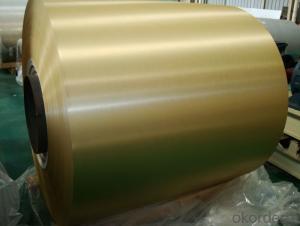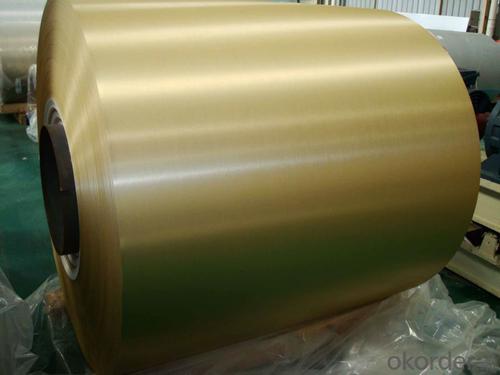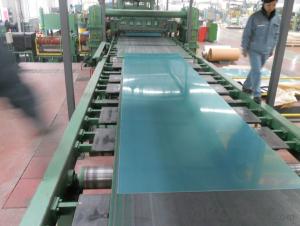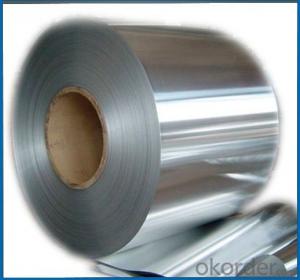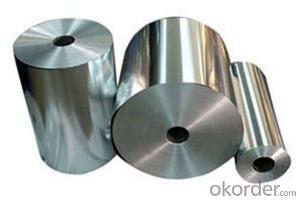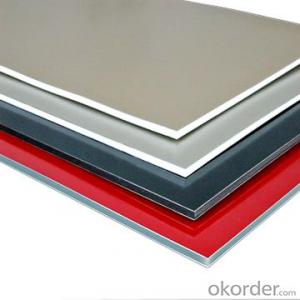Brushed Coated Aluminium Coils for Metal Wall ACP
- Loading Port:
- Shanghai
- Payment Terms:
- TT OR LC
- Min Order Qty:
- 5 m.t.
- Supply Capability:
- 10000 m.t./month
OKorder Service Pledge
OKorder Financial Service
You Might Also Like
Item specifice
1. Structure of Brushed Coated Aluminium Coils for Metal Wall ACP Description
• Product: Aluminim coils
• Application:
corrugated roofs, outer walls, ovens, electrically controlled cabinets.
household appliances, transportation, base plate, color coating.
industrial freezers in the residential and industrial buildings.
refrigerator backplane, gas stove, air conditioner, microwave, LCD border.
• Advantage: Full production line with all kinds of coils supply
2. Main Features of the Brushed Coated Aluminium Coils for Metal Wall ACP
• Our goods quality is top, the surface is smooth, and every steel coil
• No Joint, No Bends, no spots, no roller marks.
• MTC will be provided with goods, third part inspection is acceptable, for example, SGS, BV. Etc
3. Brushed Coated Aluminium Coils for Metal Wall ACP Images
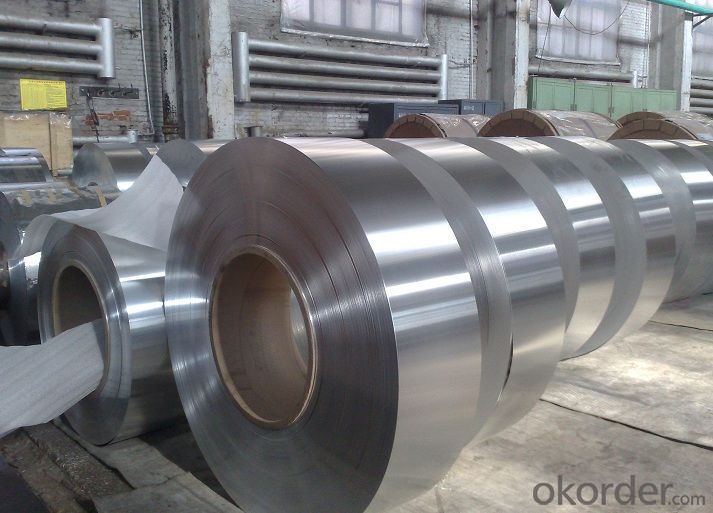
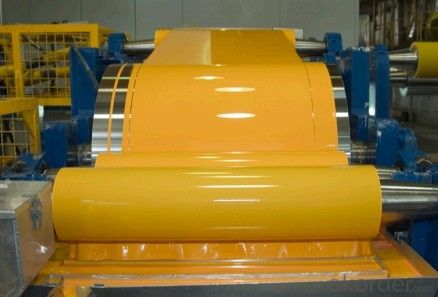
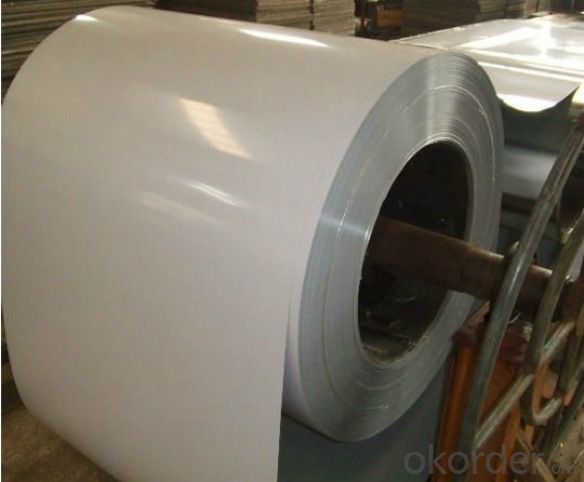
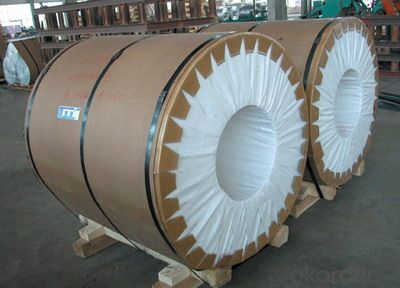
4. Brushed Coated Aluminium Coils for Metal Wall ACP Specification
Alloy | AA1050/1100/3003/3005/3105/5005/5052 etc |
Thickness | 0.03mm—4.0mm |
Width | 10mm—1600mm |
Coating | PVDF, PE |
Coatingthickness | Usually16-25 micron, could be 33-40 micron |
Color | According to Ral |
Standard | ASTM-B 209 GB/3008-2006 |
Usage/ApplicationsCoated Aluminum Coil/Sheet | Constructionand decoration, electronic appliances, lighting decoration, air-condition airpipe, sandwich panels and drainage, etc |
5.FAQ of Brushed Coated Aluminium Coils for Metal Wall ACP
We have organized several common questions for our clients,may help you sincerely:
① How about your company?
A world class manufacturer & supplier of aluminum coil and alloy blanks. Aluminum production base is comprised of 18 aluminum annealers, 10 coil and foil mills, 4 continuous production lines, 2 hot rolling production line and 3 prepainted lines.
Export 5000 tons per month to Asia, America and Middle East. Always do the best for our clients.
②Can you guarantee the quality of the products?
We are responsible for the quality of materials to get a long-term cooperation with clients in a reasonable period of time and we are glad to arrange and coordinate any third party inspection for you.
③What is the delivery time after purchase?
35 day after receiving client’s deposit or correct LC
- Q:Can aluminum coils be used in the production of aluminum composite panels?
- Yes, aluminum coils can be used in the production of aluminum composite panels. Aluminum coils are often used as the base material for manufacturing aluminum composite panels (ACP). ACPs are made by bonding a thin aluminum coil to a thermoplastic core using a bonding adhesive. The aluminum coil provides strength and stability to the panel while the thermoplastic core offers insulation and rigidity. The use of aluminum coils allows for flexibility in design and customization of the panels. Additionally, aluminum coils are durable, lightweight, and resistant to corrosion, making them an ideal choice for ACP production.
- Q:Can aluminum coils be customized according to specific requirements?
- Yes, aluminum coils can be customized according to specific requirements. Manufacturers can adjust the size, thickness, and shape of the coils to meet the specific needs of customers. They can also apply various coatings or finishes to enhance the performance or appearance of the coils.
- Q:Are aluminum coils suitable for architectural cladding applications?
- Yes, aluminum coils are suitable for architectural cladding applications. Aluminum is lightweight, durable, and corrosion-resistant, making it an ideal material for cladding buildings. It can be easily formed into various shapes and sizes, allowing for creative and unique designs. Additionally, aluminum coils offer excellent weather resistance, low maintenance requirements, and a wide range of color options, making them a popular choice in architectural cladding projects.
- Q:Are aluminum coils suitable for outdoor applications?
- Yes, aluminum coils are suitable for outdoor applications. Aluminum is known for its excellent corrosion resistance, making it a popular choice for outdoor use. It is not prone to rust or deterioration when exposed to moisture, sunlight, or harsh weather conditions. Additionally, aluminum coils are lightweight, durable, and have a high strength-to-weight ratio, making them ideal for various outdoor applications such as roofing, gutters, air conditioning systems, and outdoor furniture. Moreover, aluminum is a highly recyclable material, making it an environmentally-friendly choice for outdoor projects. Overall, aluminum coils are a reliable and practical option for outdoor applications.
- Q:Are there any limitations on the width-to-thickness ratio of aluminum coils?
- Yes, there are limitations on the width-to-thickness ratio of aluminum coils. The width-to-thickness ratio is an important factor in determining the overall strength and performance of aluminum coils. If the ratio is too high, it can lead to issues such as buckling, warping, or even failure of the coil. The specific limitations on the width-to-thickness ratio depend on various factors such as the alloy composition, temper, and intended application of the aluminum coil. Different alloys and tempers have different mechanical properties and can handle different ratios. Additionally, the intended application of the coil, such as roofing, automotive, or packaging, may have specific requirements for the width-to-thickness ratio. Manufacturers typically provide guidelines and specifications for the acceptable width-to-thickness ratio based on their product offerings. These guidelines ensure that the coils are used within their intended capabilities and prevent any issues related to excessive width-to-thickness ratios. It is important for users and designers to consider these limitations and guidelines when selecting and utilizing aluminum coils. Failure to adhere to these limitations can result in compromised performance, increased risk of damage, and potential safety concerns. Therefore, it is crucial to consult the manufacturer's recommendations and industry standards to determine the appropriate width-to-thickness ratio for a given application.
- Q:Can aluminum coils be used in power generation facilities?
- Aluminum coils are indeed suitable for use in power generation facilities. Aluminum, being a highly conductive material, offers numerous benefits for power generation applications. Its exceptional thermal conductivity allows for efficient heat transfer from the coils, a critical factor in cooling systems within power generation facilities. Moreover, aluminum's lightweight nature simplifies handling and installation, setting it apart from metals such as copper. This lightweight attribute also contributes to cost savings by reducing overall equipment weight. Additionally, aluminum's corrosion resistance is particularly valuable in power generation facilities, which frequently operate in challenging environments. In conclusion, considering their conductivity, thermal efficiency, lightweight nature, and corrosion resistance, aluminum coils present a feasible choice for power generation facilities.
- Q:What is the role of aluminum coils in the construction of railways?
- The construction of railways heavily relies on aluminum coils, which possess unique properties and advantages. These coils are widely utilized in the manufacturing of railway tracks and train cars. One of the primary functions of aluminum coils in railway construction is their contribution to lightweighting. Aluminum, being a lightweight material, is ideal for reducing the overall weight of railway components. This is significant because lighter trains and tracks require less energy for operation, leading to improved fuel efficiency and reduced operating costs. Additionally, the decreased weight of aluminum components allows for increased payload capacity, enabling trains to carry more passengers or freight. Another crucial role of aluminum coils lies in their corrosion resistance. Railways are exposed to various environmental conditions, such as moisture, salt, and extreme temperatures. Aluminum possesses excellent corrosion resistance properties, making it highly durable and long-lasting even in harsh environments. This diminishes maintenance and replacement costs associated with rust and corrosion, ensuring the longevity and reliability of the railway infrastructure. Furthermore, aluminum coils offer excellent conductivity, which is essential for electrical and signaling systems in railways. Aluminum's high electrical conductivity facilitates efficient power transmission and distribution, enabling seamless communication between trains, signaling devices, and control systems. This contributes to the safety and efficiency of railway operations. Moreover, aluminum coils can be easily formed and fabricated into various shapes, providing flexibility in railway design and construction. This versatility allows for the production of customized railway components, such as curved tracks or aerodynamic train carriages, to meet specific project requirements. In conclusion, the indispensable role of aluminum coils in railway construction is attributed to their lightweight, corrosion-resistant, conductive, and versatile nature. Their incorporation into railway infrastructure results in various benefits, including enhanced fuel efficiency, reduced maintenance costs, improved safety, and the ability to design and construct innovative railway systems.
- Q:i am thnking of building my own aluminum john boat and using the propulsion from a jetski to power it, i was wondering if anyone had taken on a project like this and had a few pieces of advice to offer while i am still in the planning stages. the biggest concern i have right now involves the tunnel for the intake, should i use the original fiberglass from the jetski or build up a tunnel out of aluminum for it?
- 518 okorder /
- Q:Why does aluminum foil burn in the microwave but not in the oven?
- Because of the conductive nature of foil intensifies the microwaves in small areas of the foil to a temperature far greater than can be achieved in an oven.
- Q:What are the common surface defects found in aluminum coils?
- Surface defects commonly found in aluminum coils include various issues such as scratches, dents, corrosion, streaking, oxide spots, oil stains, and roll marks. Scratches are visible lines or marks that can occur during handling, transportation, or processing, impacting both the appearance and functionality of the coil. Dents are depressions or deformations that can result from mishandling or impact during transportation or storage, affecting the coil's structural integrity and aesthetics. Corrosion, which can appear as pitting, discoloration, or roughness, is a concern in environments with high moisture levels or exposure to chemicals, weakening the coil and compromising performance. Streaking, thin lines or bands on the surface, may indicate uneven coating or surface contamination, potentially pointing to manufacturing issues. Oxide spots are small discolored areas caused by aluminum oxide formation during processing or storage, mainly affecting aesthetics. Oil stains are greasy or oily marks resulting from improper cleaning or handling, impacting coating adhesion and requiring additional cleaning or treatment. Roll marks, elongated depressions or raised lines caused by the rolling process, are generally unavoidable but excessive or severe instances can negatively affect appearance and quality. Implementing proper quality control measures, handling techniques, and storage practices can help minimize or prevent these surface defects in aluminum coils.
1. Manufacturer Overview |
|
|---|---|
| Location | |
| Year Established | |
| Annual Output Value | |
| Main Markets | |
| Company Certifications | |
2. Manufacturer Certificates |
|
|---|---|
| a) Certification Name | |
| Range | |
| Reference | |
| Validity Period | |
3. Manufacturer Capability |
|
|---|---|
| a)Trade Capacity | |
| Nearest Port | |
| Export Percentage | |
| No.of Employees in Trade Department | |
| Language Spoken: | |
| b)Factory Information | |
| Factory Size: | |
| No. of Production Lines | |
| Contract Manufacturing | |
| Product Price Range | |
Send your message to us
Brushed Coated Aluminium Coils for Metal Wall ACP
- Loading Port:
- Shanghai
- Payment Terms:
- TT OR LC
- Min Order Qty:
- 5 m.t.
- Supply Capability:
- 10000 m.t./month
OKorder Service Pledge
OKorder Financial Service
Similar products
New products
Hot products
Hot Searches
Related keywords
